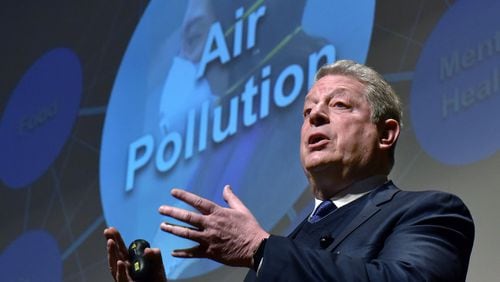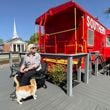A climate change meeting in Atlanta on Thursday had all the ingredients of a political spectacle.
With Donald Trump, a noted skeptic of climate change science winning the the White House, a nervous federal agency scrapped plans to host the event. Enter, Al Gore. The former Democratic presidential candidate helped revive the conference and took to the podium Thursday to talk about his signature issue.
But it was science - not politics - that carried the day.
In the climate and health meeting held at The Carter Center, Gore steered clear of mentioning Trump. Instead, he stressed that climate changes could render parts of the Middle East - including some of the holiest cities on the planet - uninhabitable. It could also cause deadly health problems and reduce life expectancy. Those in poverty will be hardest hit, he said.
The event was supposed to be a three-day conference held at the Centers for Disease Control. But when that event was cancelled following the presidential election, Gore helped organize a condensed, one-day meeting instead.
The former vice president urged scientists and health care providers to unite in efforts to combat the effects of climate change.
Among the most serious problems presented to conference attendees was the belief that the rising heat index could make parts of the world uninhabitable, Gore said.
“This is a relatively new finding, that in some areas of the Middle East and north Africa, there will be, according to the scientific predictions, areas that will no longer be fit for human habitation – beyond the limits for human survival,” Gore said. “The holy cities of Mecca and Medina are in this zone. Two years in Iran, the heat index – the combination of temperature and humidity – reached 165 degrees Fahrenheit.
“No human being can live for more than a few hours outdoors in those conditions,” Gore said.
Despite the gloomy outlook, Gore said there are ways to deal with the effects of climate change, but those will take collaboration both in the U.S. and abroad.
“We do have the solutions at hand,” Gore said. “Hope is justified. We are going to win this. We have solutions that are now readily available.”
Experts from Columbia University, Harvard University, the University of Wisconsin the World Health Organization and the CDC were among the speakers and panelists at the fast-paced conference.
“We’re doing three days in one day,” Gore joked at the microphone during sessions.
Atlanta resident Cindy Powell, who has worked in critical care, attended the conference because she’s returning to school and is interested in public health. She was saddened the initial conference was cancelled, but said Thursday’s meeting was a resilient effort.
“It’s better than nothing. It’s a start,” Powell said. “The positive forces of the world intend to move forward regardless.”
Leslie Bass, a commercial photography student, didn’t know exactly what she’d be attending as part of an internship. But she was shocked at the staggering numbers of health issues and deaths related to climate changes.
“This is way bigger than politics, but politics in our country are going to hinder progress,” Bass said. “It’s not some myth. These are not alternative facts.”
About the Author






